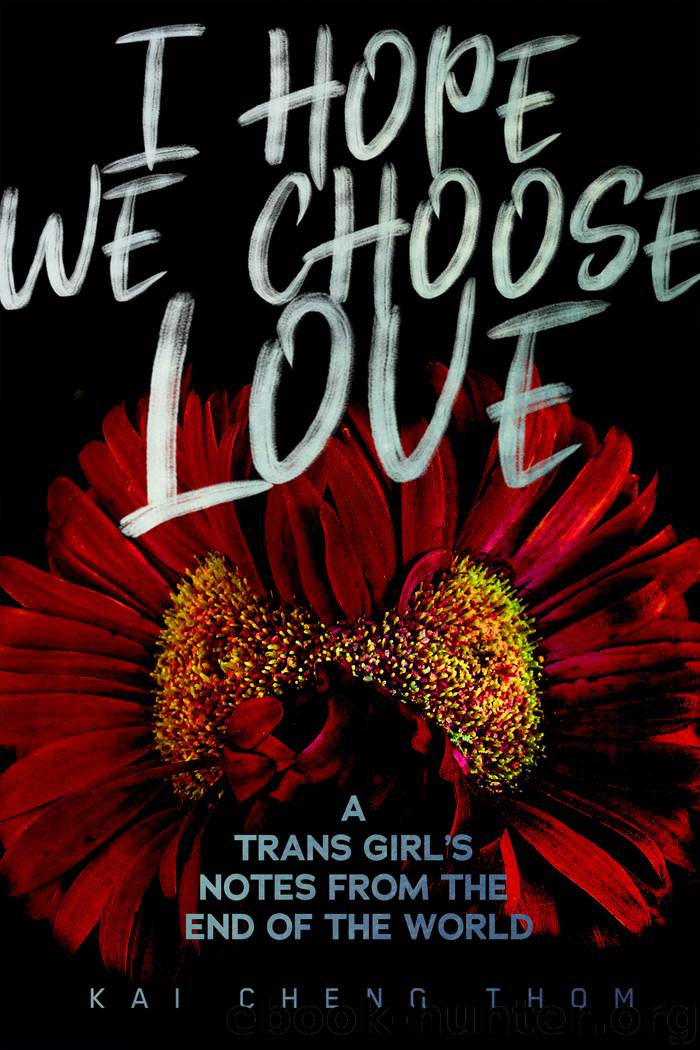I Hope We Choose Love by Kai Cheng Thom

Author:Kai Cheng Thom
Language: eng
Format: epub
Publisher: Arsenal Pulp Press
Published: 2019-03-17T16:00:00+00:00
boundaries ii
your trauma is not mine
to hold. only you
can do that.
my pain is not yours
to heal.
only i
can do that.
I Hope We Choose Love
Notes on the Application of Justice
I’m not a big believer in justice. That skepticism extends to the notions of accountability, restorative justice, transformative justice, and most of the related terms that have taken hold in social justice culture—though I do very strongly believe in integrity, honesty, and personal honour. “Integrity” is a word you hear used fairly frequently in social justice circles, but honesty and honour, as I know them, are values that come to me through my Chinese family and upbringing. Honesty, in my family, means saying what you mean, even if it is unpopular. Honour means acting in a way that your ancestors would be proud of, even if it requires personal sacrifices to do so. However, “honour” is not a word you hear very much in social justice community, and I feel its distinct lack as an influence on activist conduct. I used to be much more of a believer in justice. I had drunk the Kool-Aid, though I wasn’t ever really clear on exactly what justice meant. Rather ironically, I think a lot of people who are involved in social justice “activism”—scare quotes used because activism means a lot of different things to different people—aren’t too clear on a working definition of justice. There is a subset of folks, of course, who have thought about the definition of justice a lot, but my sense is there is great disagreement and confusion among them. And why not? Justice is a pretty highfalutin philosophical concept. Over the years of my adolescence and early adulthood, I gave a great deal of myself to the idea of justice: time, energy, dignity, health. I made huge personal sacrifices to try to live up to the leftist ideals of justice, particularly accountability—which in the circles I ran in had a lot to do with using the right political language (which always changes) and doing all the right political things all the time, and then admitting in no uncertain terms that you were guilty and “problematic” when you were inevitably called out for infractions. There’s actually a fair amount of good learning in that ideology—it teaches humility and listening to the voices of people in pain, which is pretty much always good in my book.
Unfortunately, the enactment of “justice” in radical leftism also played out in my life as a total invalidation of my boundaries (and I am not great at boundaries in the first place). For a time, I became quite valorized in my local community as a “good” upholder of social justice because I was very skilled at using the right language and doing the right things, and I tended to apologize unreservedly and perfectly when I “fucked up.” I now recognize this as a skill born of trauma: the ability to ceaselessly and accurately scan the people in one’s environment for a sense of what will please them, and then to enact it, no matter the cost to one’s long-term health.
Download
This site does not store any files on its server. We only index and link to content provided by other sites. Please contact the content providers to delete copyright contents if any and email us, we'll remove relevant links or contents immediately.
| African-American Studies | Asian American Studies |
| Disabled | Ethnic Studies |
| Hispanic American Studies | LGBT |
| Minority Studies | Native American Studies |
Cecilia; Or, Memoirs of an Heiress — Volume 1 by Fanny Burney(31333)
Cecilia; Or, Memoirs of an Heiress — Volume 3 by Fanny Burney(30934)
Cecilia; Or, Memoirs of an Heiress — Volume 2 by Fanny Burney(30889)
The Great Music City by Andrea Baker(21318)
We're Going to Need More Wine by Gabrielle Union(18074)
Bombshells: Glamour Girls of a Lifetime by Sullivan Steve(13109)
Pimp by Iceberg Slim(12932)
All the Missing Girls by Megan Miranda(12752)
Fifty Shades Freed by E L James(12451)
Norse Mythology by Gaiman Neil(11883)
Talking to Strangers by Malcolm Gladwell(11879)
Crazy Rich Asians by Kevin Kwan(8351)
Mindhunter: Inside the FBI's Elite Serial Crime Unit by John E. Douglas & Mark Olshaker(7834)
The Lost Art of Listening by Michael P. Nichols(6474)
Enlightenment Now: The Case for Reason, Science, Humanism, and Progress by Steven Pinker(6406)
Bad Blood by John Carreyrou(5770)
The Four Agreements by Don Miguel Ruiz(5511)
Weapons of Math Destruction by Cathy O'Neil(5038)
We Need to Talk by Celeste Headlee(4870)
